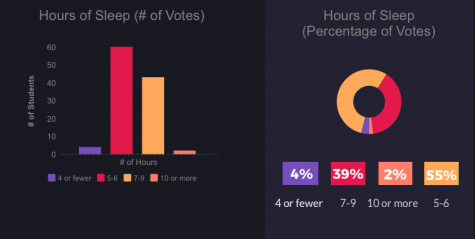Goodnight, Sleeplessness. Good Morning, Attentiveness

October 27, 2017
Famous female author Charlotte Brontë once said, “A ruffled mind makes a restless pillow.” For high school students, sleep is far from an easy task when school work and tomorrow’s full agenda is on their minds. With the 2017-2018 school year now in full swing, it seems that there is a serious sleep deprivation epidemic afflicting the student body. Busied by their extracurriculars and boatloads of work, many students are not getting enough sleep at night. There are many contributing factors as to why students are not getting enough sleep, the two most prevalent reasons being technology use and excessive homework.

“I find it hard to concentrate in class when I don’t have enough sleep, but I also have a lot of homework to do,” said Ariana Bondi (‘20) when asked about how lack of sleep affects her ability to focus in class. Sleep is necessary for adolescents to maintain a healthy body and mind, things that need to be at their best during an eight-hour school day. Without a well-rested mind, it is impossible for students to be attentive and alert for the long day ahead. According to a recent Echo poll, 59% of students said that they obtain six or fewer hours of sleep per night. That is four hours fewer than the Sleep Foundation’s recommended eight-ten hours of sleep that teenagers should get per night (sleepfoundation.org). When asked about why she goes to bed later, Bondi said, “Most nights I fall asleep while binge-watching a show on Netflix.” A recent study conducted by Sleep.org concluded that “The blue emitted by screens on cell phones, computers, tablets, and televisions restrains the production of melatonin, a hormone that controls your sleep/wake cycle.” Cell phones and tablets have become a staple in our day-to-day lives, but before going to bed, think twice about scrolling through Instagram or watching your new favorite show on Netflix. A show or a couple of posts can be one of the reasons behind that feeling of grogginess when getting up the next day.
According to the Echo poll, only 2% of voters receive 10 or more hours of sleep per night. A student getting more than 10 hours of sleep per night is considered a rarity. One of those rarities is Sophia Dongaris (‘20), who said, “If I don’t get at least 10 hours of sleep, I am a zombie the next day and I can’t concentrate.” Dongaris explained how she has nightly rituals to manage a heavy workload while still receiving a hefty amount of sleep. For those who have a hard time balancing sleep and school work, Dongaris suggests spacing studying over various nights, and making sure to study the day a test or quiz is announced. Another recommendation by Dongaris is to turn off all electronic devices when getting ready for bed. The only electronic she allows is her phone to set an alarm.
A good night’s sleep is a staple in growing adolescents. Whether balancing school work or extracurriculars, it is vital to receive a lengthy amount of sleep per night. Without the recommended eight-ten hours, students cannot perform at their best during a busy school day. Some solutions to this problem are easy, including studying a bit per night so you’re not up late cramming before a test, and turning off electronics to increase melatonin production.
Are you a part of the 59% that doesn’t get enough sleep? If so, follow some of these tips that lead to a well-rested body and mind.
















































































































































